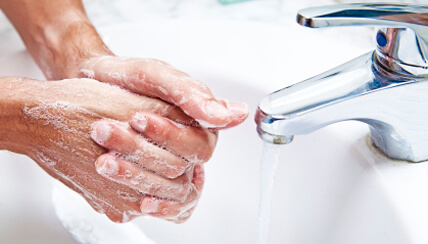 As a patient in a health care setting, you are at risk of getting an infection while you are being treated for something else. Patients and their loved ones can play a role in asking and reminding health care providers to wash their hands. Your hands can spread germs too, so protect yourself by washing your hands often. Hand-washing is one of the most important ways to prevent infections.
As a patient in a health care setting, you are at risk of getting an infection while you are being treated for something else. Patients and their loved ones can play a role in asking and reminding health care providers to wash their hands. Your hands can spread germs too, so protect yourself by washing your hands often. Hand-washing is one of the most important ways to prevent infections.
When should your health care providers wash their hands?
Every time they enter an exam/procedure room and before touching you
Before wearing gloves
After removing gloves
Wearing gloves alone is not enough to prevent the spread of infection
Before starting any tasks on you (taking blood pressure, drawing blood, etc..)
After contact with body fluids, nonintact skin, wound dressings
When their hands are visibly soiled
Upon leaving the exam room
Use your voice for clean hands
Don’t be afraid to use your voice: it’s ok to ask your health care providers to wash their hands.
For better results, you too should wash your hands often.
When should I wash my hands?
After touching hospital surfaces such as bedrails, bedside tables, doorknobs, remote controls
Before eating
Before, during and after preparing food
After using the restroom
After coughing, sneezing or caring for someone who is ill
After taking out the garbage
After petting animals
How should I wash my hands?
With soap and water:
Wet your hands with warm water. Use liquid soap if possible. Apply a nickel- or quarter-sized amount of soap to your hands.
Rub your hands together until the soap forms a lather and then rub all over the top of your hands, in between your fingers and the area around and under the fingernails.
Continue rubbing your hands for at least 15 seconds. Need a timer? Imagine singing the “Happy Birthday” song twice.
Rinse your hands well under running water.
Dry your hands using a paper towel if possible. Then use your paper towel to turn off the faucet and to open the door if needed.